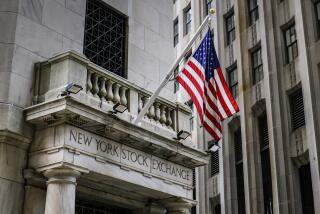S&P; Slaps China With Credit Downgrade
- Share via
Amid the growing political tension between China and Taiwan, China suffered another psychological blow Wednesday as Standard & Poor’s Corp. cut the nation’s sovereign credit rating because of economic worries.
But Chinese stocks in Shanghai and Shenzhen rallied nonetheless on expectations that the government will take more steps to boost the markets.
S&P;, cutting China’s debt rating for the first time, reduced it from BBB+ to BBB--the second-lowest investment grade rating before junk status. That takes the rating back to where it was in 1992, when S&P; first assigned a grade.
S&P; warned that government spending is hiding the extent of China’s economic slowdown.
“The S&P; action highlighted the problems of the current growth cycle in China--growth driven by state-sector spending, which is masking weakness in the private sector and falling net exports,” said Eden Wong, associate director of credit research at Barclays Capital Asia Ltd. in Hong Kong.
China said Friday that its economy grew by a slower-than-expected 7.6% in the first half.
China’s credit downgrade is likely to spark renewed speculation about a possible devaluation of the nation’s currency, which the government held steady throughout the economic turmoil that slammed other East Asian nations during the last two years.
While a devaluation could boost China’s growth by making its exports cheaper for foreign buyers, it would also slash Chinese purchasing power. The government insists it won’t devalue.
Despite rising fears about the economy, however, China’s Class A shares--those available only to Chinese--have soared in Shanghai and Shenzhen since mid-May as the government has actively encouraged local buying with interest rate cuts and other moves.
China hopes that enriched stock investors will spend more, boosting the economy.
Despite a recent pullback, the Shanghai A-share index is up 52% since mid-May.
Class B shares also surged in early June, then plunged in recent weeks on devaluation worries.
But on Wednesday, the B-share indexes of both Shanghai and Shenzhen soared more than 9%.
The government gave the go-ahead to Shenzhen-based Great Wall Securities to increase its registered capital, a move that is expected to boost trading activity.
“Allowing securities firms to expand their capital bases essentially means helping the stock markets’ development,” said Christine Lu, an analyst at Orient Securities Co.
In addition, major securities firms may be allowed to raise their capital by selling corporate bonds and putting up bonds and equities as collateral for bank loans, the Hong Kong Economic Times said.
According to the same report, China plans more interest rate cuts to spur markets and will allow insurance and state companies to invest in stocks.
(BEGIN TEXT OF INFOBOX / INFOGRAPHIC)
China on the Big Board
Chinese company shares traded on the New York Stock Exchange have soared since early June, tracking the rebound in the Shanghai and Shenzhen stock markets as the Chinese government has actively attempted to spur a market rally. NYSE-traded Chinese shares, with their listing dates and stock price data:
*--*
Listing 52-week Wed. Stock (ticker symbol) date high-low close Shanghai Petrochem. (SHI) 7/26/93 $24.13-$5.31 $20.06 Shandong Huaneng Power (SH) 8/4/94 5.88-3.38 4.31 Huaneng Power Intl. (HNP) 10/6/94 17.50-6.31 14.69 Jilin Chemical Industrial (JCC) 5/22/95 14.00-3.38 12.88 Guangshen Railway (GSH) 5/13/96 8.56-4.13 6.56 China Eastern Airlines (CEA) 2/4/97 14.94-4.00 12.00 Beijing Yanhua Petrochem. (BYH) 6/24/97 11.50-2.56 9.75 China Southern Airlines (ZNH) 7/30/97 13.94-3.06 11.31 Yanzhou Coal Mining (YZC) 3/31/98 19.75-4.88 18.13
*--*
Source: Reuters; New York Stock Exchange
More to Read
Inside the business of entertainment
The Wide Shot brings you news, analysis and insights on everything from streaming wars to production — and what it all means for the future.
You may occasionally receive promotional content from the Los Angeles Times.








